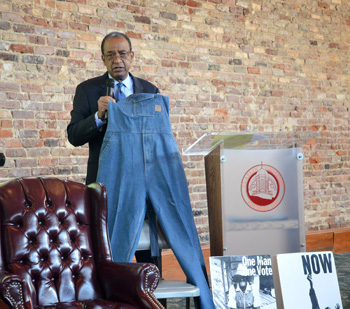Dr. Cleveland Sellers Gives Inspiring Presentation to Claflin's Honors College Leadership Class
Sep 29, 2016
Dr. Cleveland Sellers’ presentation to a group of Claflin students Tuesday in Ministers’ Hall was both a history lesson and the story of a transformational journey. Sellers spoke to more than 100 students from the Alice Carson Tisdale Honors College Leadership Class where he shared lessons in leadership, personal photographs and encouragement for the future.
 Sellers was president at Voorhees College from 2008 until his retirement in June 2016. He has been on the front lines of the Civil Rights Movement since he was a teenager. Sellers, who was born in Denmark, S.C., participated in the historic 1963 March on Washington. Sellers earned his bachelor's degree at Howard University and his master's at Harvard. He received his doctorate at the University of North Carolina - Greensboro. Sellers was the director of the African American Studies program at the University of South Carolina prior to being named president of Voorhees. His youngest son is Bakari T. Sellers, a former member of the S.C. House of Representatives who is currently a CNN political correspondent.
Sellers was president at Voorhees College from 2008 until his retirement in June 2016. He has been on the front lines of the Civil Rights Movement since he was a teenager. Sellers, who was born in Denmark, S.C., participated in the historic 1963 March on Washington. Sellers earned his bachelor's degree at Howard University and his master's at Harvard. He received his doctorate at the University of North Carolina - Greensboro. Sellers was the director of the African American Studies program at the University of South Carolina prior to being named president of Voorhees. His youngest son is Bakari T. Sellers, a former member of the S.C. House of Representatives who is currently a CNN political correspondent.
Sellers gained national attention when on February 8, 1968 he was involved in “The Orangeburg Massacre.” The incident started as a march to protest a segregated bowling alley and resulted in the death of three students on the campus of South Carolina State University.. Sellers was the only person who was charged and sent to prison following a controversial trial. He was later pardoned for his role in the incident.
“I have been arrested, shot and served time in prison. I have faced a lot of obstacles,” said Sellers. “But you never let anything take you off your course. But it requires faith in God and faith in yourself.”
Sellers said that it was his faith along with the desire to get the best education possible, and his focus on serving mankind that helped him develop his skills in leadership and organization.
“Those are the essential qualities leaders need to bring about the transformational change that is necessary in our society -- faith in God, a good education and the desire to help improve the lives of others,” he said.
Sellers took the audience through cultural and societal influences that shaped African American attitudes for more than 50 years. He began with stories about the segregated South when African Americans adhered to an “etiquette” during interactions with whites that included not looking whites in the eye or engaging them in lengthy conversations. He then showed photographs of Emmitt Till and others who were brutally murdered when they acted outside of what was considered acceptable behavior for Blacks. Till was only 14 years old when he was killed in Mississippi after reportedly whistling at a white woman. Sellers explained the dangers he faced and the sacrifices he and others made while registering voters in Mississippi in the 60's.
"There was no reciprocal compensation for what we did. We did not get paid," Sellers said. "We did it because we knew change was necessary. We knew also we were putting our lives on the line. But we knew what we were doing what was right and we relied on our faith in God. "
Sellers' photo collection included images of him with Martin Luther King, Stokely Carmichael, James Meredith, Floyd McKissick and other leaders of the Civil Rights Movement.
"I was with Stokely with he used the term 'Black Power' for the first time," said Sellers. "A lot of people are saying they were involved in The Movement and participated in the marches but I don't recall some of them being there. I know I was there and I have the pictures to prove it.
The 60's and 70's were periods when the attitudes and philosophies changed related to how we were going to achieve justice and equality," he said. "We found strength and unity from the church and I hope today's leaders can go back to the themes that helped us move forward. There is too much said in the church about prosperity, materialism and individualism. We need to hear more that promotes unity and about making a difference in the world from all of our leaders."
Sellers emphasized the importance of civic engagement, having a sense of purpose and the willingness to make sacrifices.
"You have to get off your cell phones and your computers and get involved," Sellers said. "Stepping up and stepping out takes courage and confidence. Young people have always been the difference makers and initiated change. The older generation will always criticize what you are doing. But don't allow anything or anyone to be an obstacle or distract you from achieving your goals."